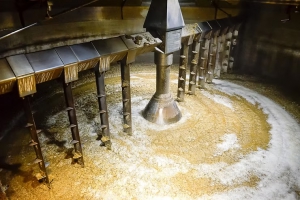Turning bourbon distillery waste into mycelium materials: A scalable approach from Kentucky
Distilleries produce more than just spirits. In Kentucky—home to 95% of the world’s bourbon—booming production has led to a surge in byproducts, particularly stillage: a nutrient-rich slurry of spent grains and moisture left after distillation. Traditionally used as animal feed or disposed of via wastewater systems, stillage is now gaining attention as a promising input for bio-based materials.
A recent study from the University of Kentucky published in Fungal Biology and Biotechnology, explores how this overlooked waste stream can be transformed into pure mycelium materials (PMM) using solid-state fermentation. By feeding stillage solids to fast-growing fungi like Rhizopus oligosporus, researchers were able to produce tunable, leather-like sheets of aerial mycelium. The process not only valorises distillery byproducts but also opens up new avenues for sustainable material production at scale.
Fast-Growing Fungi, Flexible Materials Most commercial mycelium materials are made using Basidiomycota fungi such as Pleurotus ostreatus, known for their ease of cultivation and controllable growth. But the Kentucky study tested R. oligosporus, a Mucoromycota species used in tempeh fermentation. Its advantage? Speed. The fungus grew up to four times faster than P. ostreatus, producing dense mats of mycelium in just three to five days under controlled conditions. The team focused on growing aerial mycelium—the fluffy, thread-like structures that rise above the substrate. These fibres can be harvested and processed into flexible, leather-like sheets. Their quality and structure depended on several factors: substrate packing density, support height, and nutrient composition.
Please read the full article here.
Source: MycoStories
Photo: Depositi photos
Poland: Mushroom production during pandemic
The export of mushrooms in retail packaging is going relatively well. Poland managed to maintain stable markets, but during certain periods, mainly in the spring time, when pandemic started, fewer shipments were made. The prices of mushrooms remained unchanged, according to the data of the Polish Association of the Cultivated Mushroom Industry.
75% of mushrooms produced in Poland goes abroad. In mushroom industry Poland is absolutely dependent on exports.
The situation has been very serious since spring. Particularly at the very beginning of the pandemic, there was great uncertainty. The more as in countries where large amounts were shipped, i.e. Germany, France, Italy and Great Britain, a lockdown was introduced. Schools, restaurants and hotels were closed. HoReCa suffered what meant lack of orders. The introduced restrictions, especially in Great Britain, made it very difficult to trade in mushrooms.
Production and trade
At the very beginning of the pandemic, manufacturers limited the production of substrate. After three weeks, there were significantly fewer mushrooms on the market. At the moment, the production of the substrate is relatively normal.
The pandemic has caused great instability in trade. Order for five cars suddenly turns into two cars. It is known that the mushrooms will sell out by Christmas, but then there is a 'dead period'.
Labour
Mushrooms are grown all year round. There is no seasonality in this industry. Production is very labor intensive, which means people are needed. This year, the great challenge was to find employees for mushroom picking. After all, Poland employs workers from the Eastern border in the entire horticultural sector. Currently, the situation is slowly normalizing.
Source: Ministerie van Landbouw, Natuur en Voedselkwaliteit
For questions on this article, please mail to This email address is being protected from spambots. You need JavaScript enabled to view it.






















